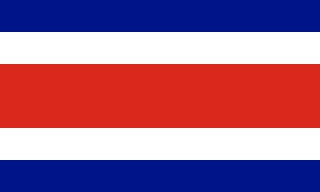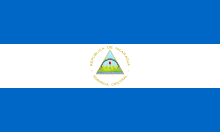
Costa Rica, officially the Republic of Costa Rica, is a country in the Central American region of North America. It borders Nicaragua to the north, the Caribbean Sea to the northeast, Panama to the southeast, and the Pacific Ocean to the southwest, as well as maritime border with Ecuador to the south of Cocos Island. It has a population of around five million in a land area of nearly 51,180 km2 (19,760 sq mi). An estimated 352,381 people live in the capital and largest city, San José, with around two million people in the surrounding metropolitan area.

Central America is a subregion of North America. Its political boundaries are defined as bordering Mexico to the north, Colombia to the southeast, the Caribbean to the east, and the Pacific Ocean to the southwest. Central America is usually defined as consisting of seven countries: Belize, Costa Rica, El Salvador, Guatemala, Honduras, Nicaragua, and Panama. Within Central America is the Mesoamerican biodiversity hotspot, which extends from southern Mexico to southeastern Panama. Due to the presence of several active geologic faults and the Central America Volcanic Arc, there is a high amount of seismic activity in the region, such as volcanic eruptions and earthquakes, which has resulted in death, injury, and property damage.

José Daniel Ortega Saavedra is a Nicaraguan politician and the 58th president of Nicaragua since 10 January 2007. He previously led Nicaragua from 1979 to 1990, first as Coordinator of the Junta of National Reconstruction from 18 July 1979 to 10 January 1985, and then as the 54th president from 10 January 1985 to 25 April 1990.

Nicaragua, officially the Republic of Nicaragua, is the geographically largest country in Central America, comprising 130,370 km2 (50,340 sq mi). With a population of 7,142,529 as of 2024, it is the third-most populous country in Central America after Guatemala and Honduras.

The economy of Nicaragua is focused primarily on the agricultural sector. Nicaragua itself is the least developed country in Central America, and the second least developed in the Americas by nominal GDP, behind only Haiti. In recent years, under the administrations of Daniel Ortega, the Nicaraguan economy has expanded somewhat, following the Great Recession, when the country's economy actually contracted by 1.5%, due to decreased export demand in the American and Central American markets, lower commodity prices for key agricultural exports, and low remittance growth. The economy saw 4.5% growth in 2010 thanks to a recovery in export demand and growth in its tourism industry. Nicaragua's economy continues to post growth, with preliminary indicators showing the Nicaraguan economy growing an additional 5% in 2011. Consumer Price inflation have also curtailed since 2008, when Nicaragua's inflation rate hovered at 19.82%. In 2009 and 2010, the country posted lower inflation rates, 3.68% and 5.45%, respectively. Remittances are a major source of income, equivalent to 15% of the country's GDP, which originate primarily from Costa Rica, the United States, and European Union member states. Approximately one million Nicaraguans contribute to the remittance sector of the economy.

Nicaragua pursues an independent foreign policy. A participant of the Central American Security Commission, Nicaragua also has taken a leading role in pressing for regional demilitarization and peaceful settlement of disputes within states in the region.

The Organization of American States is an international organization founded on 30 April 1948 to promote cooperation among its member states within the Americas.

The Sandinista National Liberation Front is a Christian socialist political party in Nicaragua. Its members are called Sandinistas in both English and Spanish. The party is named after Augusto César Sandino, who led the Nicaraguan resistance against the United States occupation of Nicaragua in the 1930s.

The córdoba is the currency of Nicaragua and is divided into 100 centavos.

The Nicaraguan Revolution began with rising opposition to the Somoza dictatorship in the 1960s and 1970s, the ouster of the dictatorship in 1978–79, and fighting between the government and the Contras from 1981 to 1990. The revolution revealed the country as one of the major proxy war battlegrounds of the Cold War.

The Nicaragua national football team represents Nicaragua in men's international football and is controlled by the Nicaraguan Football Federation. Nicaragua achieved their first qualification into a major international competition in 2009, as they qualified for the 2009 Gold Cup as the last entrant from Central America, after a 2–0 victory against Guatemala in the fifth place match in the 2009 Nations Cup. However, the team has never qualified for the FIFA World Cup.

The Central Bank of Nicaragua is the central bank of Nicaragua.

Friendly bilateral relations now exist between Nicaragua and the United States. However, in the 19th and 20th centuries, tensions were high and American intervention was frequent. In the 1980s, due to Red Scare paranoia and an attempt to put down socialism in the region, the U.S proceeded to wage an undeclared war against the left-wing Sandinista movement by funding the Contra groups until it was defeated in the election in 1990.

The National Nicaraguan Police Force is the national police of Nicaragua. The force is in charge of regular police functions and, at times, works in conjunction with the Nicaraguan military, making it an indirect and rather subtle version of a gendarmerie. However, the Nicaraguan National Police work separately and have a different established set of norms than the nation's military.

Denmark–Nicaragua relations refers to the bilateral relationship between Denmark and Nicaragua. Denmark is accredited to Nicaragua from its embassy in Mexico City, Mexico. Nicaragua is accredited to Denmark from its embassy in Helsinki, Finland. The relations are described as good. Nicaragua is a Danish programme country since 1993.

Nicaragua sent a delegation to compete at the 2016 Summer Paralympics in Rio de Janeiro, Brazil, from 7–18 September 2016. This was the Central American country's third appearance at the Summer Paralympic Games, having made its debut twelve years earlier at the 2004 Summer Paralympics. They were represented by three athletes, sprinter Jennifer Osejo, middle-distance runner and sprinter Gabriel Cuadra Holmann and powerlifter Fernando Acevedo, who all qualified for the games by achieving the minimum qualifying standard in international competition. Neither Holmann or Osejo claimed a medal in their respective events and Acevado finished fifth in the men's −72kg powerlifting class.

Nicaragua competed at the 2019 Pan American Games in Lima, Peru from July 26 to August 11, 2019.
The Apostolic Nunciature to Nicaragua is an ecclesiastical office of the Catholic Church in Nicaragua. It is a diplomatic post of the Holy See, whose representative is called the Apostolic Nuncio with the rank of an ambassador. The nuncio resides in Managua.
The COVID-19 pandemic in Nicaragua was a part of the worldwide pandemic of coronavirus disease 2019 caused by severe acute respiratory syndrome coronavirus 2. The virus was shown to have spread to Nicaragua when the first case, a Nicaraguan citizen who had returned to the country from Panama, was confirmed on 18 March 2020.















